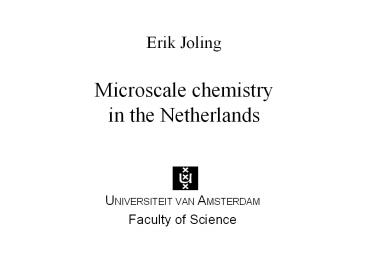Erik Joling Microscale chemistry in the Netherlands PowerPoint PPT Presentation
Title: Erik Joling Microscale chemistry in the Netherlands
1
Erik JolingMicroscale chemistryin the
Netherlands
- UNIVERSITEIT VAN AMSTERDAM
- Faculty of Science
2
Four points of view
- Industry and government (I)
- Teachers in secondary education (T)
- University (U)
- Pupils (P)
3
Where are the Netherlands?
4
What are the Netherlands?
- A small country between England (overseas),
Germany and Belgium - 9220 km (5730 miles) from Mexico City
- 15,750,000 people
- Worlds largest port Rotterdam
- Home of Shell, Akzo-Nobel, Unilever, DSM
5
What is produced in the Netherlands?
- Windmills (a few)
- Wooden shoes (some more)
- Flowers (lots)
- Peanut butter (Worlds 2)
- Chemicals (tons)
6
Chemical industry (I)
- Largest branch of industry
- 60 bulk / 40 fine
- 15 of industrial production
- 20 of industrial export
- 10 of employment
7
Chemical industry (I)
- Twice as much academics as in other branches
- Achilles heel number of chemists educated
8
Interest in chemistryFinal exams 1999 (I)
9
Interest in chemistry Final exams 1999 (I)
10
Interest in chemistryFirst-year students in 1999
(I)
- University 537 (2)
- Higher Laboratory Education 472
- Higher Vocational Education 214
11
Consequences for secondary chemistry education (I)
- Chemical industry and government are willing to
spend money! - Schools adopted by companies
- Projects are initiated and supported
- AXIS-project to promote science and technology
12
Change of doctrine in upper-secondary education
(T)
- Studiehuis study-home
- independent learning
- streams
- projects
- introduced summer 1998 and 1999
13
Consequences for secondary chemical education (T)
- Need for a real-life approach
- Need for example projects
- Need for a student oriented lab
14
Late eighties (U)
- Universiteit van Amsterdam
- Desire for a microscale laboratory in second year
- Mayo, Pike Trumper
- Microscale Organic Laboratory
- very interesting
- too expensive
15
Method and kit (U)
- Williamson
- Macroscale and microscale organic experiments
- economical
16
Introduction into the curriculum (U)
- Williamson visited Europe
- instruction for PhD students
- summer 1989
- half of the second year organic lab miniaturised
- winter 1990
- conversion complete
17
Results (U)
- Reduction of
- waste
- chemicals
- cost of breakage to 15
18
Further steps (U)
- summer 1997
- second year inorganic lab miniaturised
- Szafran, Pike, and Singh
- Microscale inorganic chemistry
19
Consequences for secondary chemical education (U)
- Lecturer was member section chemical education of
the Royal Netherlands Chemical Society - promoted microscale chemistry
- initiated a project
20
Project Microscale experiments
- Universiteit van Amsterdam
- Chemistry Communication Center Foundation
- November 1996 - December 1999
- glassware
- low-cost heating device
- manuals
- training
21
Glassware
22
Low-cost heating device
23
Manuals
- Adaptation of existing experiments
- Teachers manual and students manual
- are loose-leaf
- flexible
- rearrangeable
- supplements
24
Training
- Over 330 schools (gt 50)
- 600 teachers
- One afternoon training
- on-site
- at the University
25
Future plans
- more experiments
- projects including a teacher-training
- coupling with computer (Coach 5)
- PhD-research project
- another road to organic chemistry
- Axis-project
- Industry on microscale
26
Industry on microscale
- 3-year project
- teachers and industrial chemists work together to
make - teaching materials related to real contexts
- blueprint for school-company co-operation
27
Other microscale initiatives (UI)
- Vrije Universiteit Amsterdam
- Chemistry Communication Center Foundation
- Chemistry in droplets
28
Other microscale initiatives (T)
- Frans Killian (teaching assistant)
- Aonne Kerkstra (teacher)
- Miniaturisation of their own school laboratory
- 96-well microplates
- micro titrations
- µ-GLC
29
(P) Why microscale experiments?
- Michael Schallies (Heidelberg, Germany)
- We must focus on the 95 pupils that do not
choose to become a chemist - Their chemistry in school is the only change in
their lives to explore nature by experimenting
30
Contact me
- micro_at_chem.uva.nl
- www.chem.uva.nl/chemeduc/microschaal
- /MicroQuim2000

